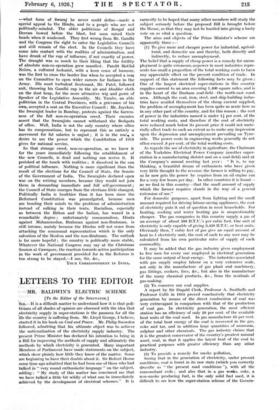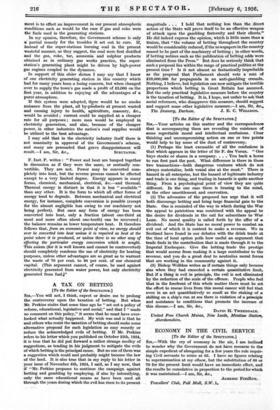LETTERS TO THE EDITOR
MR. BALDWIN'S ELECTRIC SCHEME
[To the Editor of the SPECTATOR.] is a difficult matter to understand how it is that poli- ticians of all shades of opinion are obsessed with the idea that electricity supply. in super-stations is the panacea for all the ills the country is- suffering fiom. Mr. Lloyd George, I believe, started it in his book on Coal and Power. Mr. Philip Snowden followed, admitting that, his ultimate object was to achieve the nationalization of the electricity supply industry. The present Prime Minister has declared his intention to bring in a Bill for improving the methods of supply and ultimately the methods by which electricity is generated. Many important Members of Parliament have made statements on the subject, which show plainly how little they know of the matter. Some are beginning to have their doubts about it. Sir Robert Horne some -time ago admitted that he had been one of those who had talked in "very round enthusiastic language " on the subject, adding : " My study of this matter has convinced me that we. have talked a little bit wildly of what can be immediately achieved by the development of electrical schemes." It is earnestly to be hoped that many other members will study the subject seriously before the proposed Bill is brought before the House; so that they may not he hustled into giving a hasty vote on so vital a question: The aims and. objects of the Prime Minister's scheme are apparently three :—
(1) To give'more and cheaper power for industrial, agricul- tural, and domestic use and thereby, both directly and indirectly, to reduce unemployment.
The belief that a supply of cheap power is a remedy for unem- ployment is quite erroneous, as power in most industries repre- sents too small a proportion of the total working costs to have any appreciable effect on the present condition of trade. In support of this statement the following facts may be given : One of the largest electrical super-stations in this country supplies current to an area covering 1,400 square miles, and is in the heart of the Durham coal-field—the north-east coast area. Although the coal, iron, steel, and ship-building indus- tries have availed themselves of the cheap current supplied, the problem of unemployment has been quite as acute here as in any other part of the country, and for this reason : the cost of power 'in the industries named is under 1* per cent. of the total working costs, and therefore if the cost of electricity were reduced much below its present price it could not mate- rially affect trade to such an extent as to make any impression upon the depression and unemployment prevailing on Tyne- side. The power costs in engineering works generally do not often exceed .8 per cent. of the total working costs.
As regards the use of electricity in agriculture, the Chairman of the Yorkshire Electrical Power Company (another super- station in a manufacturing district and on a coal-field) said at the Company's annual meeting last year " It is, to my thinking, a beautiful dream of enthusiasts who hive given very little thought to the revenue the farmer is willing to pay, as he now gets the power he requires from an oil engine run for a very few hours per day. In other countries it is found— as we find in this country—that the small amount of supply which the farmer requires stands in the way of a general extension of use."
For domestic purposes, apart from lighting and the small amount required for driving labour-saving appliances, the cost of electricity puts it out of question in most households. For heating, cooking and water heating gas is unquestionably cheaper. The gas companies in this country supply a gas of an average of about 500 B.T.U.'s per cubic foot. One unit of electricity is only capable of giving 3,420 B.T.U. or heat units. Obviously then, 7 cubic feet of gas give an equal amount of heat to 1 electricity unit, the cost of each to any user may be calculated from his own particular rates of supply of each commodity.
It may be added that the gas industry gives employment to five men for every one employed in electrical generation for the same output of heat energy. The industries associated with gas supply employ labour on a very extensive scale, not only in the manufacture of gas plant and machinery, gas fittings, cookers, fires, &c., but also in the manufacture of the many chemical products, &c., from the residuals of gas-making.
(2) To conserve our coal supplies.
A report by Sir Dugald Clerk, Professor A. Smithells and Professor Cobb in 1919 proved conclusively that electricity generation by means of the direct combustion of coal was very extravagant in comparison with that of the production of coal gas. In electricity generation, the most efficient station has an efficiency of only 20 per cent. of the available heat units of the coal used. In gas manufacture 85 per cent. of the total heat energy of the coal is recovered in the ,gas, coke and tar, and in addition large quantities of ammonia, sulphur and other chemicals. The gas industry claims that it is the greatest conservator of the country's greatest natural asset, coal, in that it applies the latent heat of the coal to practical purposes with greater efficiency than any other industry. (3) To provide a remedy for smoke pollution, Seeing that in the generation of electricity, under present conditions, coal is burnt in its raw state (which you correctly describe as " the present mad conditions "), with all the concomitant evils ; and also that in a gas works, coke, a non-smoke producing fuel, is the only solid fuel used, it is difficult to see how the super-station scheme of the Govern- went is to effect an improvement in our present atmospheric conditions such as would be the case if gas and coke were the fuels used in the generating stations.
In my opinion, therefore, the Government scheme is only a partial remedy for the troubles it set out to cure. If, instead of the super-stations burning coal in the present wasteful manner, as they suggest, the coal were first distilled and the gas, coke, tar, ammonia and sulphur products obtained as in ordinary gas works practice, the super- station's generating plant might be driven by high-power gas engines coupled to the dynamos.
In support of this obiter dictum I may say that I know of one electricity generating station in this country which had for many years been a losing concern, but when changed over to supply the town's gas made a profit of £3,000 on the first year, in addition to enjoying all the advantages of a purer atmosphere.
If this system were adopted, there would be no smoke nuisance from the plant, all by-Aiducts at present wasted and causing injury to health, agriculture, masonry, &c., would be avoided ; current could be supplied at a cheaper rate for all purposes ; more men would be employed in electricity generation, and also, because of the cheaper power, in other industries the nation's coal supplies would be utilized to the best advantage.
I may add that in the electricity industry itself there is not unanimity in approval of the Government's scheme, and many are persuaded that grave disappointment will
F. Inst. P. writes : " Power and heat are lumped together in discussion as if they were the same, or mutually con- vertible. They are not. Power may be converted com- pletely into heat, but the reverse process cannot be effected except to a very limited degree. Energy appears in many forms, chemical, mechanical, electrical, &c.—and thermal. Thermal energy is distinct in that it is less " available " than any other. It is the form to which all other forms of energy tend to degrade. Between mechanical and electrical energy, for instance, complete conversion is possible (except for the almost negligible loss owing to our machinery not being perfect). But once any form of energy has been converted into heat, only a fraction (about one-third at most and more often about one-tenth) can be recovered ; the balance remains as lower temperature heat. It therefore follows that, from an economic point of view, no energy should ever be converted into heat unless it is required as heat at the point where it is produced, or unless there is no other way of effecting the particular energy conversion which is sought. This axiom (for it is well known and cannot be controverted) should completely condemn the use of electricity for heating purposes, unless other advantages are so great as to warrant the waste of 70 per cent. to 90 per cent. of our chemical capital. (This argument cannot, of course, be used against electricity generated from water power, but only electricity generated from fuel.)"



























































 Previous page
Previous page